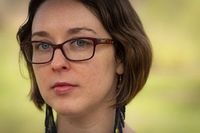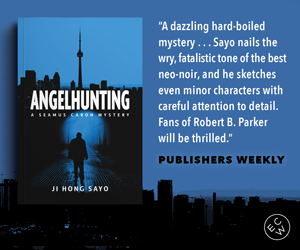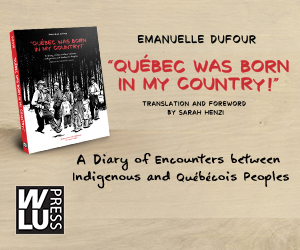Poets in Profile: Conyer Clayton on John Berryman, Seeing the Big Picture, and Finding Acceptance
Originally from Kentucky, poet, multi-disciplinary artist, and gymnastics coach Conyer Clayton is a freshly-minted Canadian citizen who now calls Ottawa home. Her debut full-length collection, We Shed Our Skin Like Dynamite (Guernica Editions - forthcoming May 2020), is an unpredictable and ethereal exploration of the ways we pacify our unhappiness, the masks we hide behind, and what waits to be confronted when we finally decide to give it all up.
Moving through addiction, relationships, the natural world, and our ultimate mortality, Clayton's words hang in the middle-space between overt meaning and open interpretation, allowing the reader to not just see but feel every moment of delicate, raw vulnerability throughout her work.
We're thrilled to have Conyer at Open Book today to discuss how a high school teacher gave her the confidence to become a serious writer, current poetry she loves, and why it's so important for tight-knit poetry communities like Canada's to recognize and welcome newcomers.
Open Book:
Can you describe an experience that you believe contributed to your becoming a poet?
Conyer Clayton:
In grade 12 of high school, my English teacher, Dr. Morehead, named me editor of our literary magazine, saying in class, "Connie is the most organized person I have ever met." This moment seems insignificant, but I think about it all the time.
I wrote often but didn't consider myself a writer. I had been a competitive gymnast my whole life, but had recently quit, and no longer considered myself an athlete. I felt like an outsider to creative circles, like I wasn't artsy or fashionable enough. I was a metal-head, but also kind of a jock. I was an extremely good student, but hosted parties in my basement. I felt very in-between groups, and had many friends in different, seemingly clashing, circles. I never thought of my organizational and time-management skills as a boon to my creativity, but Dr. Morehead showed me otherwise.
Basically, she made me feel publicly legitimized as an artist for the first time. It was a big deal to me. That year that I decided I wanted to focus on creative writing in my degrees. She put me in charge despite not being one of the cool writer kids. It made me realize I could just be myself, and also be an artist.
OB:
What is the first poem you remember being affected by?
CC:
John Berryman's “Dream Song 14”, assigned in a high school literature course. I loved the prioritization of sound, musicality, rhythm, over logical meaning. To discover I could enjoy a poem if I stopped treating it as a puzzle to be solved! To just listen, enjoy, let it wash, let it "wag," and notice how "the sky flashes, the great sea yearns." How you can be conversational and confounding all within a single poem.
Your CanLit News
Subscribe to Open Book’s newsletter to get local book events, literary content, writing tips, and more in your inbox
OB:
What one poem—from any time period—do you wish you had been the one to write?
CC:
“Saint Francis Disrobes” by Paige Lewis, from their collection Space Struck. I read it a few days ago and it hasn't left me alone. I find something new to gasp about each time I read it. This kind of fixation on a poem doesn't happen to me often.
OB:
Do you write poems individually and begin assembling collections from stand-alone pieces, or do you write with a view to putting together a collection from the beginning?
CC:
It depends on what the project calls for. We Shed Our Skin Like Dynamite began as individual pieces written over 10 years, with a unity that ran through them, which I was only able to identify much later. For my chapbooks, it has been a mix of both.
Two of my current projects are being drafted as intentional collections, restricted either in form or voice/character. I continue to write poems that are outside of either of those projects, as well. I am sure some of those poems will find their way into a collection one day, maybe in another 10 years! For me, compiling a manuscript piece-meal is a longer process, as I struggle to place myself outside of the poems to edit and to see larger themes. I need enough distance to see the threads in my life's narrative arc.
OB:
What was the last book of poetry you read that really knocked your socks off?
CC:
Calling a Wolf a Wolf by Kaveh Akbar. (I am really promoting the Paige and Kaveh power-duo, aren't I? But they are both just so good!)
It is my most widely recommended book. It is one of the only books of poetry I have ever read where every single poem impacted me. EVERY SINGLE ONE. That is a feat. The timing of my read was important, as I was just beginning a journey of recovery and sobriety, and I felt quite alone in it. I didn't know of many other young people in a similar boat. This book reached out to me, made me feel less alone in leaving alcohol behind, and all that that choice carries.
OB:
How would you describe the poetry community in Canada? What strengths and weaknesses do you observe within the community?
CC:
I am newly Canadian, just a few months into my citizenship, actually. My biggest observation, coming from the American poetry scene, is that the smallness of the Canadian scene is both a strength and a weakness.
On one hand, I have felt that in a few short years, I've been able to get a pretty good handle on what is going on in contemporary poetry. The Ottawa community specifically has been so incredibly welcoming since I began attending events in 2017. All the people behind Coven Editions, battleaxe press, above/ground press, Canthius, and ARC Poetry Magazine are incredible folks that have helped me navigate unfamiliar waters with kindness.
However, that smallness can also be insular, and the tight-knit nature of the communities a bit intimidating. It is easy to get caught up and forget the world outside of "CanLit," which is large and important. I am not sure if most cities have literary communities as welcoming as Ottawa. If you are outside the structure, and don't know how to find your way in, or how to meet anyone who can get you in, it could be very difficult. I was able to find my way with a bit of good luck, but it is really important that we watch for that person who keeps coming to poetry readings that no one knows. They might just need one person to invite them into the circle. We can all try a bit harder to be that person.
_______________________________________________________________________________________________________
Conyer Clayton is an Ottawa-based artist and gymnastics coach, originally from Louisville, Kentucky. She has 6 chapbooks; most recently Trust Only the Beasts in the Water (above/ground press, 2019). In 2018, she released a collaborative album with Nathanael Larochette, If the river stood still. She is the winner of Arc's 2017 Diana Brebner Prize and The Capilano Review's 2019 Robin Blaser Poetry Contest, and writes reviews for Canthius. Her debut full-length collection of poetry, We Shed Our Skin Like Dynamite (Guernica Editions), is forthcoming May 2020.




